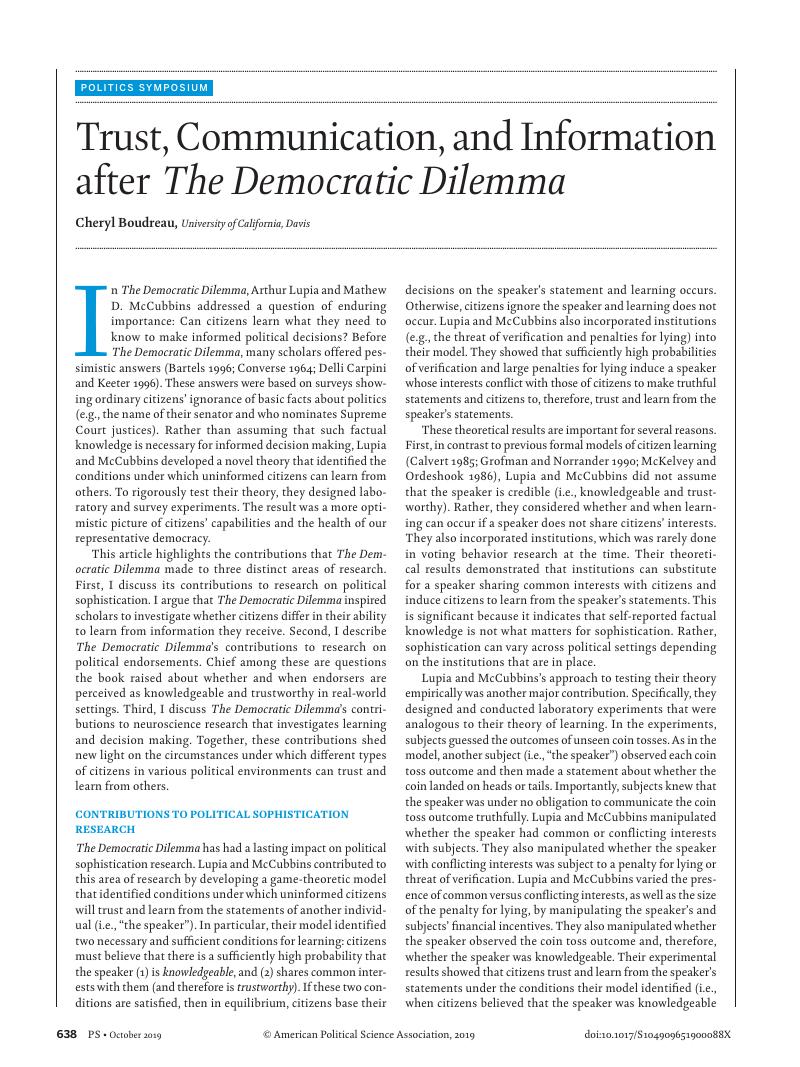No CrossRef data available.
Article contents
Trust, Communication, and Information after The Democratic Dilemma
Published online by Cambridge University Press: 08 July 2019
Abstract
An abstract is not available for this content so a preview has been provided. Please use the Get access link above for information on how to access this content.

- Type
- Symposium: Can Citizens Learn What They Need to Know? Reflections on The Democratic Dilemma
- Information
- Copyright
- Copyright © American Political Science Association 2019
References
REFERENCES
Arceneaux, Kevin, and Kolodny, Robin. 2009. “Educating the Least Informed: Group Endorsements in a Grassroots Campaign.” American Journal of Political Science 53 (4): 755–70.CrossRefGoogle Scholar
Bartels, Larry M. 1996. “Uninformed Voters: Information Effects in Presidential Elections.” American Journal of Political Science 40: 194–230.CrossRefGoogle Scholar
Boudreau, Cheryl. 2009. “Closing the Gap: When Do Cues Eliminate Differences Between Sophisticated and Unsophisticated Citizens?” Journal of Politics 71 (3): 964–76.CrossRefGoogle Scholar
Boudreau, Cheryl, Elmendorf, Christopher S., and MacKenzie, Scott A.. 2015. “Informing Electorates via Election Law: An Experimental Study of Partisan Endorsements and Nonpartisan Voter Guides in Local Elections.” Election Law Journal 14 (1): 2–23.CrossRefGoogle Scholar
Boudreau, Cheryl, Elmendorf, Christopher S., and MacKenzie, Scott A.. 2019. “Racial or Spatial Voting? The Effects of Candidate Ethnicity and Ethnic Group Endorsements in Local Elections.” American Journal of Political Science 63 (1): 5–20.CrossRefGoogle Scholar
Boudreau, Cheryl, McCubbins, Mathew D., and Coulson, Seana. 2009. “Knowing When to Trust Others: An ERP Study of Decision Making after Receiving Information from Unknown People.” Social, Cognitive, and Affective Neuroscience 4 (1): 23–34.CrossRefGoogle ScholarPubMed
Calvert, Randall L. 1985. “The Value of Biased Information: A Rational Choice Model of Political Advice.” Journal of Politics 47: 530–55.CrossRefGoogle Scholar
Churchland, Patricia S., and Sejnowski, Terrence J.. 1992. The Computational Brain. Cambridge, MA: MIT Press.CrossRefGoogle Scholar
Converse, Philip E. 1964. “The Nature of Belief Systems in Mass Publics.” In Ideology and Discontent, ed. Apter, D. E., 206–261. New York: Free Press.Google Scholar
Delli Carpini, Michael X., and Keeter, Scott. 1996. What Americans Know about Politics and Why It Matters. New Haven, CT: Yale University Press.Google Scholar
Druckman, James N. 2001a. “Using Credible Advice to Overcome Framing Effects.” Journal of Law, Economics, and Organization 17 (1): 62–82.CrossRefGoogle Scholar
Druckman, James N. 2001b. “On the Limits of Framing Effects: Who Can Frame?” Journal of Politics 63: 1041–66.CrossRefGoogle Scholar
Grofman, Bernard, and Norrander, Barbara. 1990. “Efficient Use of Reference Group Cues in a Single Dimension.” Public Choice 64: 213–27.CrossRefGoogle Scholar
Kam, Cindy D. 2005. “Who Toes the Party Line? Cues, Values, and Individual Differences.” Political Behavior 27 (2): 163–82.CrossRefGoogle Scholar
Kuklinski, James H., Quirk, Paul J., Jerit, Jennifer, and Rich, Robert F.. 2001. “The Political Environment and Citizen Competence.” American Journal of Political Science 45 (2): 410–24.CrossRefGoogle Scholar
Lau, Richard R., and Redlawsk, David P.. 2001. “Advantages and Disadvantages of Cognitive Heuristics in Political Decision Making.” American Journal of Political Science 45 (4): 951–71.CrossRefGoogle Scholar
Lupia, Arthur, and McCubbins, Mathew D.. 1998. The Democratic Dilemma: Can Citizens Learn What They Need to Know? Cambridge: Cambridge University Press.Google Scholar
McDermott, Monika L. 2006. “Not for Members Only: Group Endorsements as Electoral Information Cues.” Political Research Quarterly 59 (2): 249–57.CrossRefGoogle Scholar
McKelvey, Richard D., and Ordeshook, Peter C.. 1986. “Information, Electoral Equilibria, and the Democratic Ideal.” Journal of Politics 8: 909–37.CrossRefGoogle Scholar
Nicholson, Stephen P. 2012. “Polarizing Cues.” American Journal of Political Science 56 (1): 52–66.CrossRefGoogle ScholarPubMed




